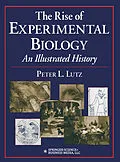For more than three thousand years our physiological and medical knowledge has developed from the simple reading of entrails to the computerized decoding of the human genome. In The Rise of Experimental Biology: An Illustrated History, Peter Lutz, PhD, brilliantly traverses the major milestones along the evolutionary path of biomedicine from earliest recorded times to the dawn of the 20th century. With an engaging narrative that will have you turning "just one more page" well into the night, this book revealingly demonstrates just how the modern scientific method has been shaped by the past. Along the way the reader is treated to some delightfully entertaining anecdotes and a treasure trove of illustrations that chronicle the tortuous history of biomedical developments, ranging from the bizarre and amusing to the downright macabre. The reader will also be introduced to the major ideas shaping contemporary experimental biology, as well as their social context, and also learn how advances in their understanding have occasionally been improperly used to satisfy momentary social or political needs.
Accessibly written and richly pictorial, The Rise of Experimental Biology: An Illustrated History will entertain as well as inform a broad audience of not only experimental biologists, medical scientists, and natural philosophers, but also everyone interested in history and medicine today.
Klappentext
Peter Lutz, PhD, brilliantly traverses the major milestones along the evolutionary path of biomedicine from earliest recorded times to the dawn of the 20th century. With an engaging narrative that will have you turning "just one more page" well into the night, this book revealingly demonstrates just how the modern scientific method has been shaped by the past. Along the way the reader is treated to some delightfully obscure anecdotes and a treasure trove of rich illustrations that chronicle the tortuous history of biomedical developments, ranging from the bizarre and amusing to the downright macabre. The reader will also be introduced to the major ideas shaping contemporary physiology and the social context of its development, and also gain an understanding of how advances in biological science have occasionally been improperly used to satisfy momentary social or political needs.
Inhalt
Introduction: Science is Improbable The Beginnings Myth and Magic Mesopotamia Egypt Early Greek Science The Milesians The Post-Milesians The Soul. Summary The Age of Plato and Aristotle Plato and Theory Aristotle and Observation The Alexandrian Period: The Age of the Experiment and the Textbook The Roman Period Celsus Pliny Galen The Dark Ages. Islamic Science Scholasticism and Science The Renaissance: The Birth of Science The Renaissance: The Birth of Experimental Biology The New Physiology Iatrochemistry Iatrophysics New Technology, New Physiology The New World of the Very Small Vital Air Reaction and Opposition The Enlightenment and Rational Biology Rational Biology The Emergence of Physiology Transition to the 19th Century: Popular Science, Eccentric Science, and Romantic Physiology Hunter and Spallanzani: The Last Great All-Rounders The Science Museum: Collecting and Displaying Romantic Physiology The Consolidation of Experimental Biology Respiration Metabolic Chemistry Internal Secretions Renal Physiology Digestion Benefits New Fields Evolution and Physiology Physiology Abused Gullability Reckless Intervention Evolutionary Genetics and Social Repression Today What is Science? Biology Today
